Wedding photography is an art that demands precision, creativity, and the best camera for wedding photography to capture unforgettable moments.
Choosing the right wedding photography camera can significantly enhance the quality of your work.
Whether you’re an aspiring wedding photographer or a seasoned professional, finding the best camera for wedding photography is essential.
This article explores top camera models, their features, and essential lenses to ensure your wedding shoots are flawless.
Compare:
Which is the Best Camera for Wedding Photography?
When it comes to wedding photography, specific camera models stand out due to their performance, versatility, and innovative features.
Let’s delve into some of the top contenders:
1. Sony Alpha a7R IVA Mirrorless Digital Camera (ILCE7RM4A/B) Body Bundle
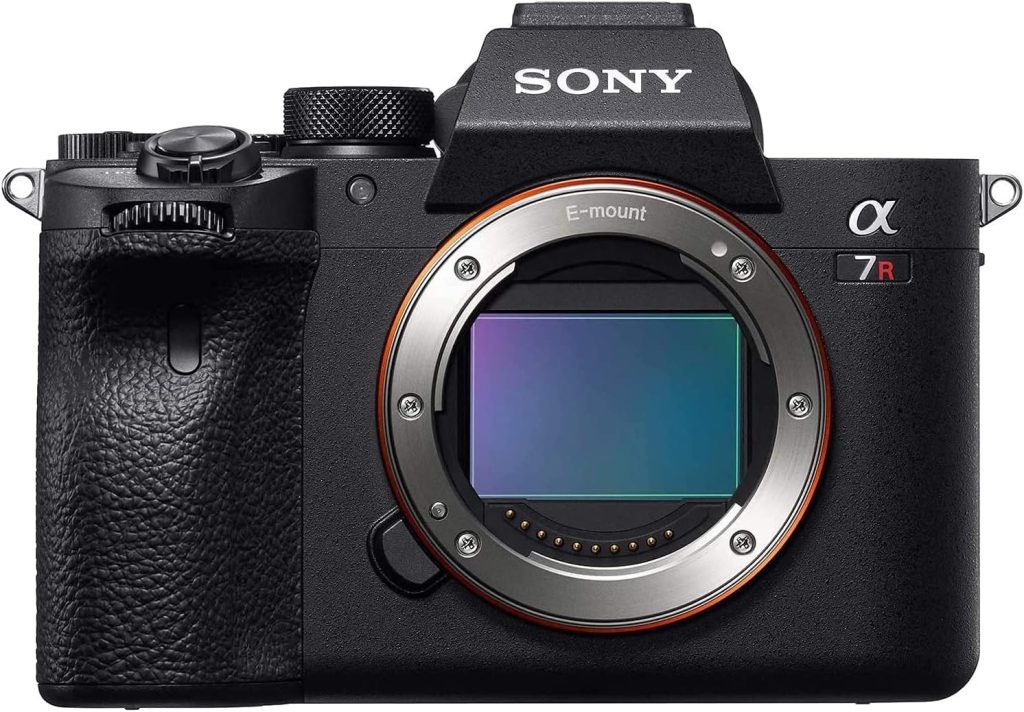
The Sony Alpha a7R IVA is a powerhouse mirrorless camera designed for professionals. Its exceptional resolution and dynamic features make it ideal for capturing intricate wedding moments.
Features
61 Megapixel Full-Frame Sensor: This sensor delivers stunning detail and color accuracy, ensuring that every wedding photograph captures the essence of the moment.
Real-Time Eye Autofocus: The advanced autofocus tracks subjects’ eyes with precision, crucial for candid shots and emotional expressions.
Impressive Burst Shooting: With up to 10 FPS, you’ll never miss a moment, whether it’s the exchange of vows or lively dancefloor antics.
Enhanced Video Capabilities: It supports 4K HDR video, making it a versatile tool for hybrid shooters who also capture wedding films.
| Pros | Cons |
| ✅ Exceptional resolution and color accuracy | ❌ Expensive compared to other models |
| ✅ Real-time autofocus for stills and videos | ❌ Complex menu system for beginners |
| ✅ Lightweight and compact for a full-frame camera | ❌ Limited battery life |
2. Nikon Z 5 | Compact Full-Frame Mirrorless Stills/Video Camera
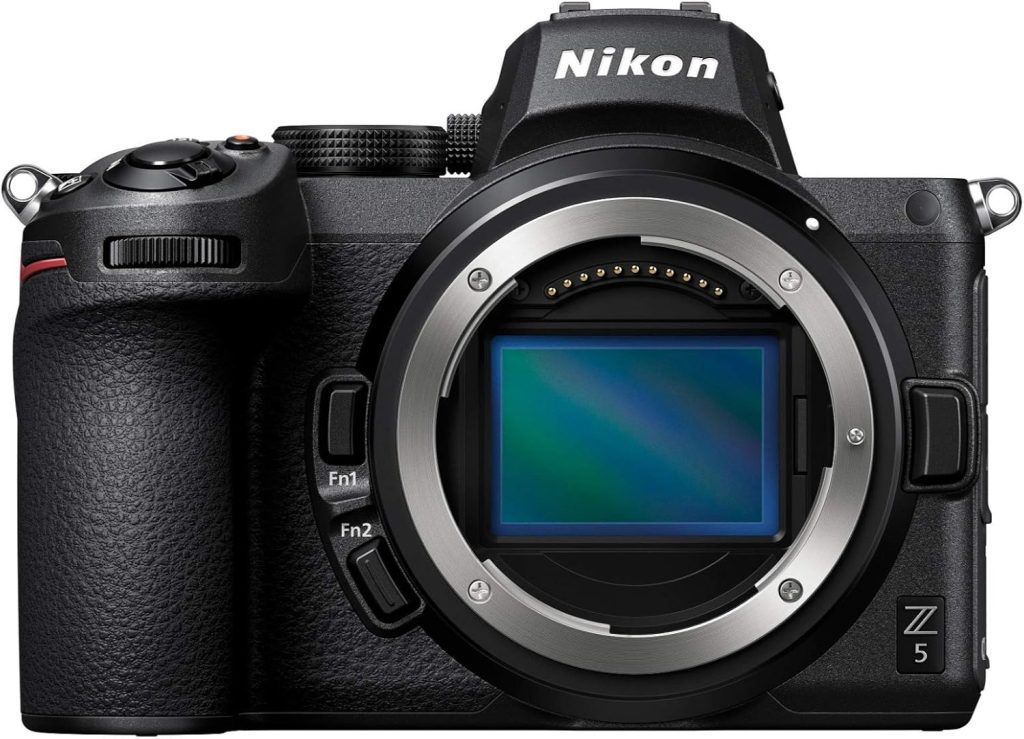
The Nikon Z 5 is a compact, full-frame mirrorless camera that balances quality and affordability. It’s an excellent choice for entry-level professionals.
Features
24.3 Megapixel CMOS Sensor: Provides high-quality images with vibrant color and excellent detail.
Dual SD Card Slots: Ensures safe storage of your precious wedding shots, with backup options to avoid data loss.
Weather-Sealed Body: Built for durability, it performs well even in challenging outdoor wedding settings.
4K UHD Video Recording: Offers cinematic video quality for wedding highlights and reels.
| Pros | Cons |
| ✅ Affordable entry into full-frame photography | ❌ Limited advanced autofocus features |
| ✅ Durable and weather-resistant build | ❌ Slightly heavier than other mirrorless cameras |
| ✅ Dual card slots for reliable storage | ❌ No in-body image stabilization |
3. Canon EOS R5 Mirrorless Camera (Body Only)
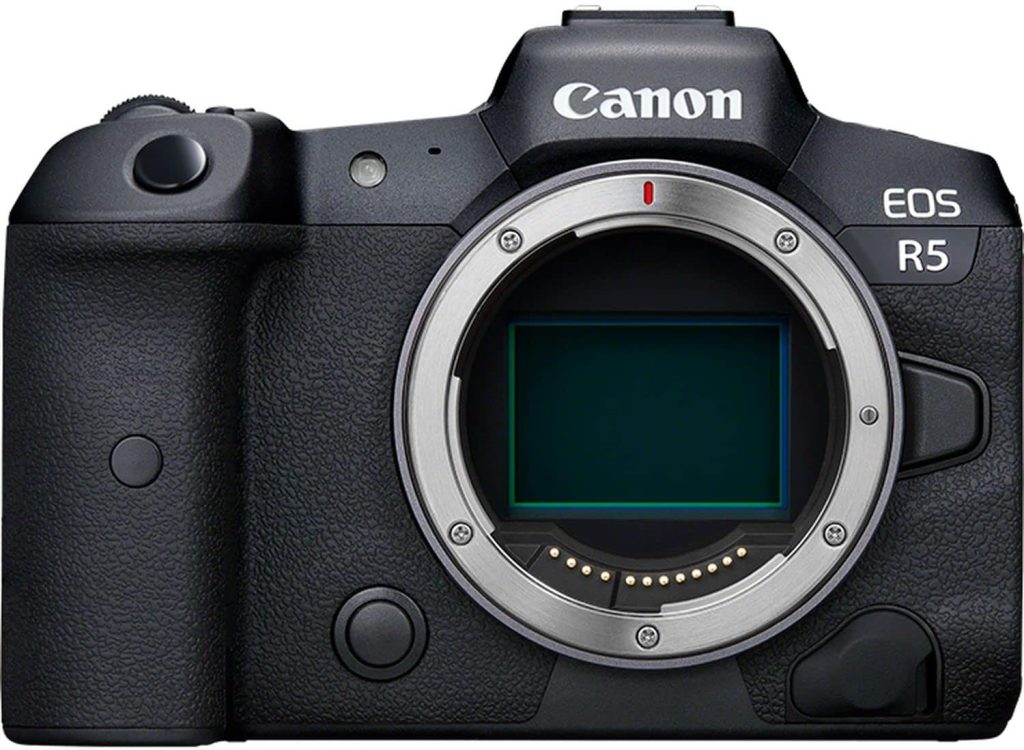
Canon’s EOS R5 is a revolutionary hybrid camera combining high-resolution photography and advanced video capabilities. It’s tailored for professionals aiming to deliver stunning wedding albums and films.
Features
45 Megapixel CMOS Sensor: Ensures incredible detail and dynamic range for every wedding shot.
8K Video Recording: Offers unmatched video resolution, perfect for creating wedding films that stand out.
DIGIC X Image Processor: Enhances speed and performance, supporting up to 20 FPS for burst shooting.
Dual Pixel CMOS Autofocus II: Tracks subjects accurately, even in challenging lighting conditions.
| Pros | Cons |
| ✅ Outstanding image and video resolution | ❌ Overheating issues during extended video recording |
| ✅ Fast and reliable autofocus system | ❌ High price point |
| ✅ Compact and lightweight design | ❌ Limited battery life |
4. Nikon Z8 Professional Full-Frame Mirrorless Camera Bundle
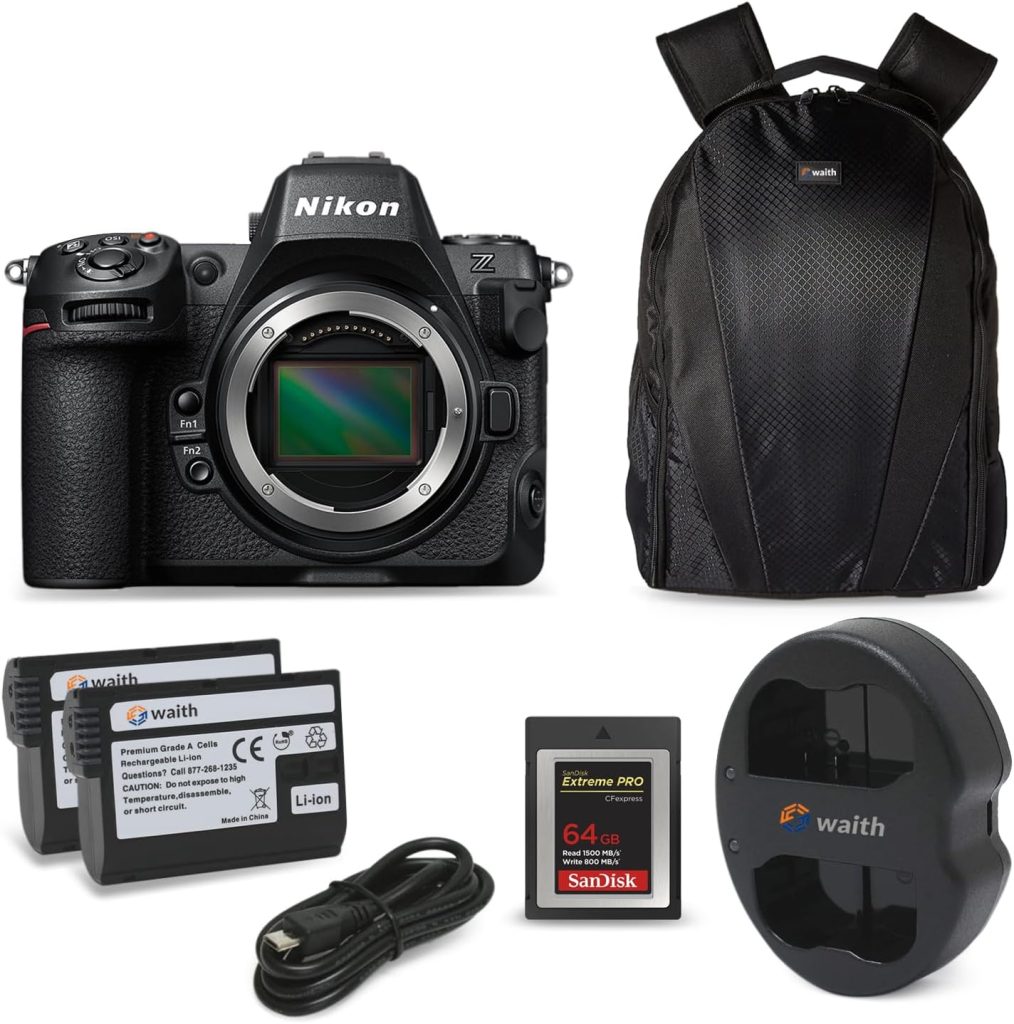
The Nikon Z8 is a professional-grade camera with cutting-edge features for wedding photography and videography.
Features
45.7 Megapixel Sensor: Delivers incredible image quality with superb dynamic range.
Advanced Autofocus System: Tracks multiple subjects seamlessly, ideal for capturing group shots and candid moments.
5-Axis In-Body Stabilization: Reduces motion blur, ensuring sharp images even in low light.
4K 120p Video Recording: Supports high-frame-rate video for creative slow-motion wedding films.
| Pros | Cons |
| ✅ Exceptional image quality | ❌ Bulky for a mirrorless camera |
| ✅ Advanced stabilization system | ❌ Expensive accessories |
| ✅ High-speed shooting capability | ❌ Learning curve for new users |
(Continue with reviews for cameras 5-9 in the same format, highlighting their unique features, pros, and cons.)
5. Panasonic LUMIX S5IIX Mirrorless Camera, 24.2MP Full Frame
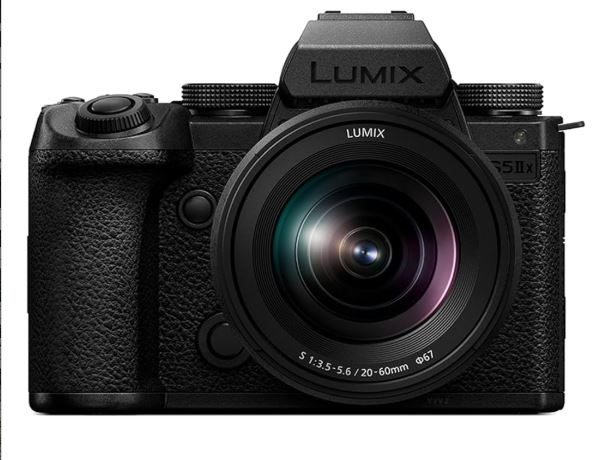
The Panasonic LUMIX S5IIX is a cutting-edge mirrorless camera designed for professionals who demand both precision and versatility.
With its exceptional hybrid capabilities, this camera excels in both photography and videography, making it a reliable choice for capturing wedding moments.
Features
24.2 Megapixel Full-Frame Sensor: This sensor ensures stunning image quality with remarkable detail and vibrant colors, ideal for preserving precious wedding memories. The full-frame capability also enhances low-light performance, a critical factor for dimly lit venues.
Phase Hybrid Autofocus: The advanced autofocus system delivers accurate and fast focusing, even in challenging lighting conditions. This feature is indispensable for capturing spontaneous moments like laughter or emotion-filled glances.
Unlimited 5.8K Video Recording: Wedding videographers will appreciate the unlimited recording feature, which allows seamless capturing of ceremonies and receptions without worrying about time constraints.
RAW Over HDMI: The camera supports ProRes RAW video output via HDMI, offering flexibility and superior quality for professional-grade wedding films.
| Pros | Cons |
| ✅ Exceptional video capabilities | ❌ Slightly heavier than competitors |
| ✅ Unlimited recording for long events | ❌ Menu system can be overwhelming |
| ✅ Advanced autofocus for precision | ❌ Battery life could be improved |
6. Nikon D850 FX-Format Digital SLR Camera Body
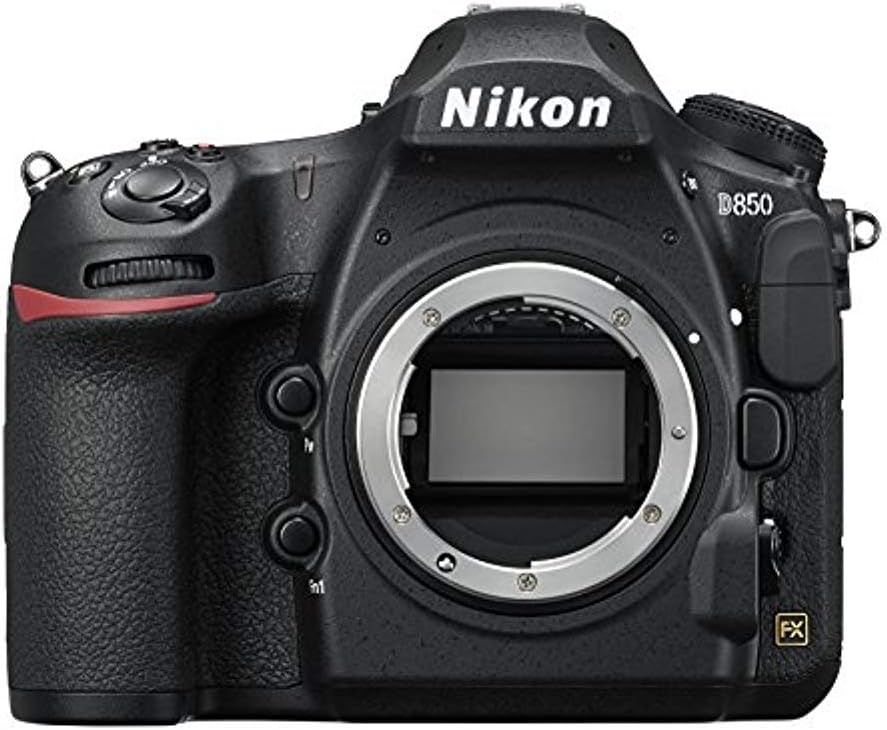
The Nikon D850 is a professional DSLR renowned for its incredible resolution and dynamic range. It’s a favorite among wedding photographers for its reliability and ability to capture intricate details.
Features
45.7 Megapixel Backside Illuminated Sensor: This sensor is designed to produce outstanding image quality, even in low light. The high resolution ensures every detail, from intricate lace to subtle facial expressions, is perfectly preserved.
7 FPS Continuous Shooting: With a fast burst mode, the D850 captures every fleeting moment, whether it’s a tearful vow or an exuberant first dance.
4K UHD Video Recording: Videographers will appreciate the ability to capture sharp and detailed wedding films in Ultra HD.
Long Battery Life: One of the highlights of the D850 is its ability to last through an entire wedding day without requiring frequent recharges, ensuring uninterrupted shooting.
| Pros | Cons |
| ✅ High resolution for detailed shots | ❌ Bulky and heavy for handheld use |
| ✅ Exceptional low-light performance | ❌ Slower autofocus in live view |
| ✅ Reliable battery life for full-day events | ❌ Expensive compared to rivals |
7. OM SYSTEM Olympus OM-1 Mark II Micro Four Thirds System Camera
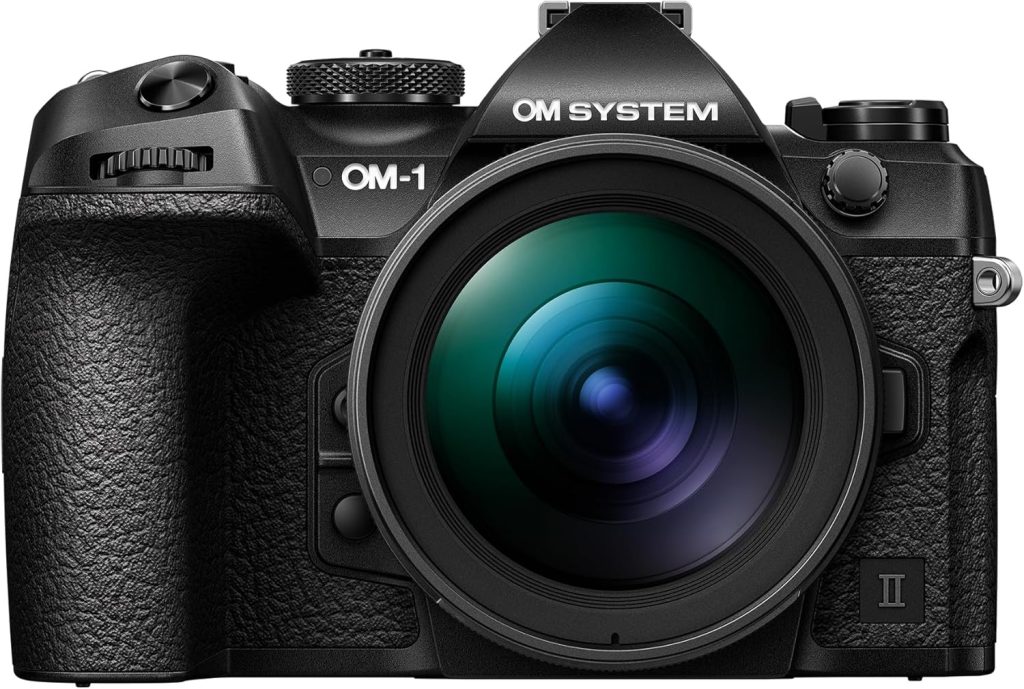
The Olympus OM-1 Mark II is a micro four-thirds camera known for its portability and rugged design. It’s an excellent option for wedding photographers looking for a compact yet capable system.
Features
20.4 Megapixel Live MOS Sensor: While not full-frame, this sensor provides impressive image quality with natural colors and fine detail, especially in well-lit scenarios.
In-Body Image Stabilization (IBIS): The 5-axis IBIS ensures sharp images even when shooting handheld, making it ideal for on-the-go wedding photography.
Weather-Sealed Design: Built to withstand challenging conditions, this camera is perfect for outdoor weddings, offering protection from rain or dust.
High-Speed Shooting: Capable of up to 60 FPS in silent mode, the OM-1 Mark II excels at capturing action-packed scenes without distracting noise.
| Pros | Cons |
| ✅ Lightweight and portable design | ❌ Smaller sensor compared to full-frame |
| ✅ Advanced stabilization for sharp shots | ❌ Limited performance in low light |
| ✅ Rugged and weather-resistant build | ❌ Limited dynamic range in challenging lighting |
8. Nikon D780 Body
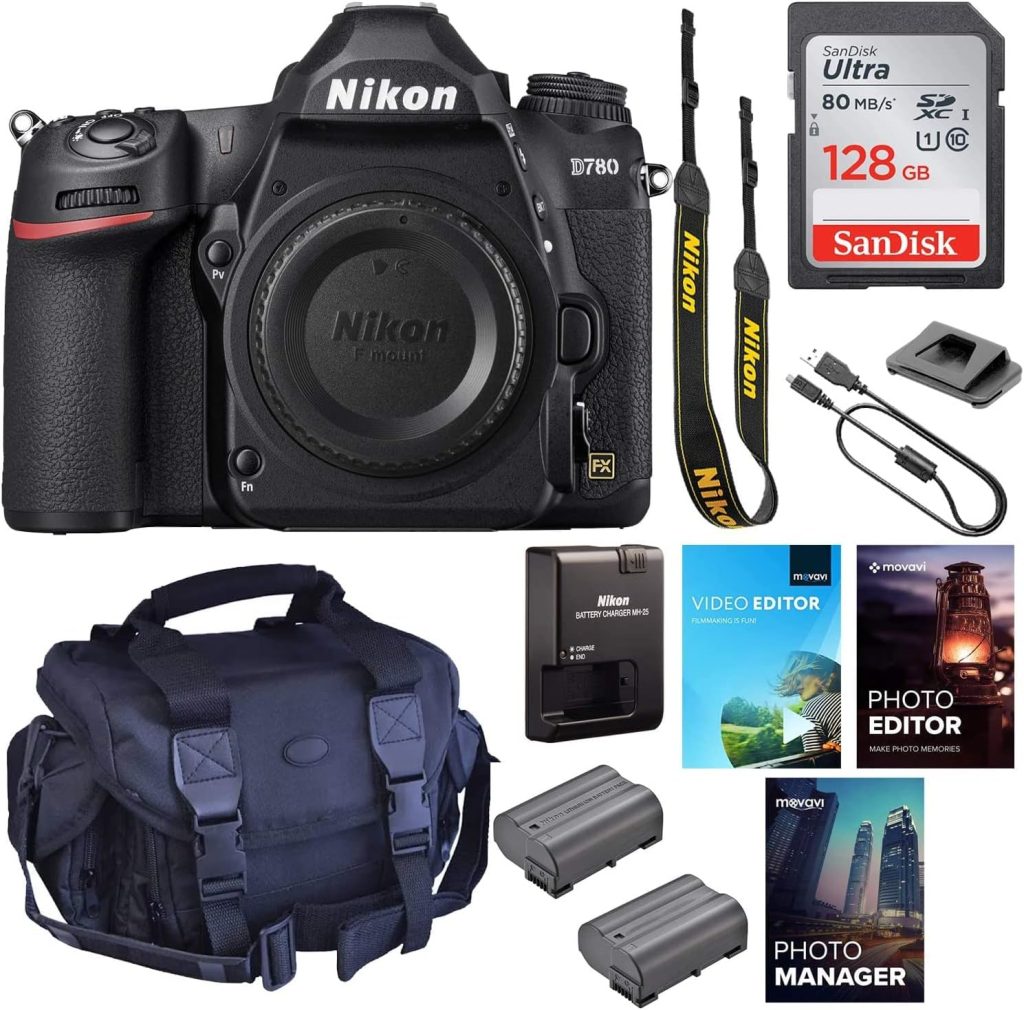
The Nikon D780 bridges the gap between DSLR and mirrorless systems, offering the best of both worlds. It’s a versatile and reliable camera, ideal for wedding photographers who need flexibility.
Features
24.5 Megapixel Full-Frame Sensor: This sensor delivers high-quality images with excellent detail and color reproduction, ensuring stunning wedding portraits and group photos.
Hybrid Autofocus System: The D780 combines the speed of mirrorless phase-detection autofocus with traditional DSLR precision, offering a reliable system for capturing moving subjects.
Dual Card Slots: Wedding photographers can shoot with peace of mind, knowing their files are safely backed up.
4K UHD Video Recording: This feature ensures top-tier video quality, making the D780 suitable for capturing cinematic wedding films.
| Pros | Cons |
| ✅ Hybrid autofocus for versatility | ❌ Bulkier than fully mirrorless options |
| ✅ Durable and ergonomic design | ❌ Limited resolution compared to rivals |
| ✅ Dual card slots for secure file storage | ❌ No in-body stabilization |
Wedding Photography Lenses

Wedding photography lenses play a pivotal role in capturing the intricate details, emotions, and grandeur of a couple’s special day.
The choice of lens can significantly influence the mood, framing, and sharpness of the images, making it essential to select the right tools for the job.
Different lenses are suited for varying purposes, from intimate portraits to wide-angle shots of the venue.
Understanding these lenses and their applications ensures versatility and creativity throughout the wedding shoot.
The 50mm f/1.2 Prime Lenses
Prime lenses, such as the 50mm f/1.2, are a favorite among wedding photographers for their stunning bokeh and sharpness.
These lenses excel in capturing portraits with a dreamy, blurred background that isolates the subject, drawing attention to their expressions.
The wide aperture of prime lenses also performs well in low-light conditions, which is invaluable for indoor ceremonies or dimly lit receptions.
Their compact size and lightweight design make them easy to handle during long shooting sessions.
The 24-70mm f/2.8 Zoom Lenses
Zoom lenses like the 24-70mm f/2.8 are indispensable for their versatility. These lenses allow photographers to switch seamlessly between wide-angle shots and closer compositions without changing lenses.
This flexibility is particularly useful during fast-paced moments, such as the couple’s entrance or the first dance.
The f/2.8 aperture provides a good balance between depth of field and light-gathering capability, making it suitable for various lighting scenarios.
The 70-200mm f/2.8 Telephoto Lens
For capturing moments from a distance, the 70-200mm f/2.8 telephoto lens is a staple in wedding photography.
This lens is ideal for ceremonies where photographers must maintain a discreet presence while still getting close-up shots of the couple, guests, or officiant.
The shallow depth of field at longer focal lengths creates beautiful subject isolation, perfect for detail shots like the ring exchange or a tearful glance.
The 16-35mm f/2.8 Wide-Angle Lenses
Wide-angle lenses, such as the 16-35mm f/2.8, are essential for capturing sweeping shots of the venue, group portraits, or candid moments on the dance floor.
They provide a broader field of view, making them perfect for showcasing architectural details or incorporating the surrounding scenery into the frame.
However, photographers must be cautious with distortion, especially at the edges, when using these lenses for group photos.
The 100mm f/2.8 Macro Lenses
Macro lenses like the 100mm f/2.8 are ideal for close-up shots of intricate wedding details.
From the lace on the bride’s dress to the texture of the wedding cake, macro lenses allow photographers to highlight these often-overlooked elements with exceptional clarity.
These lenses also work well for capturing emotional close-ups, such as a hand-holding moment or a tear-streaked face.
Lastly, lenses with image stabilization and weather-sealing are highly beneficial for wedding photography.
Image stabilization helps reduce motion blur, particularly in low-light settings or when using telephoto lenses without a tripod.
Weather-sealing ensures the lens can withstand outdoor shoots, whether under the blazing sun or during a surprise rain shower.
Choosing lenses with these features adds reliability and adaptability to a photographer’s toolkit.
Compare: Best Ergonomic Chair with Footrest
Factors to Consider When Buying a Camera for Wedding Photography
Here are seven key factors to consider when choosing a camera for wedding photography:
Image Quality and Sensor Size
Image quality is critical in wedding photography, as it captures the intricate details of dresses, flowers, and décor.
A full-frame sensor is often preferred due to its ability to handle low light, provide better depth of field, and produce sharp, detailed images with excellent dynamic range.
APS-C and Micro Four Thirds sensors can also work but may lack the depth and detail required in some scenarios.
Low-Light Performance
Weddings often take place in dimly lit venues or during evening receptions.
A camera with excellent low-light performance, high ISO capabilities, and minimal noise is essential for producing clean, sharp images in challenging lighting conditions without relying heavily on external flash.
Autofocus System
An advanced autofocus system with multiple focus points and reliable subject tracking is essential for capturing fleeting, spontaneous moments, such as a tearful vow exchange or a burst of laughter during toasts.
Cameras with phase-detection or hybrid autofocus tend to excel in speed and accuracy.
Battery Life
Wedding shoots can last an entire day, so a camera with long-lasting battery life is crucial. DSLRs often have an edge here, but many mirrorless cameras are closing the gap.
Dual batteries or battery grips can be lifesavers during extended events.
Build Quality and Weather Resistance
Outdoor weddings and unpredictable weather demand a camera that is durable and weather-sealed.
Look for a body made from magnesium alloy or similar sturdy materials that can withstand rain, humidity, and dust.
Video Capabilities
With the growing demand for wedding videos, a camera that offers 4K video recording, high frame rates, and dual recording options can be invaluable.
Features like in-body stabilization and audio input for external microphones further enhance video quality.
Lens Compatibility and System Ecosystem
The camera’s lens options and ecosystem play a significant role.
Wedding photographers need access to a wide range of lenses, from fast primes (like a 50mm f/1.2 for portraits) to versatile zooms (like a 24-70mm for general coverage) and telephoto lenses (for ceremonies).
A robust system with reliable lens options ensures creative and technical flexibility.
Each of these factors contributes significantly to your ability to capture weddings with professionalism and artistry.
FAQs on Best Camera for Wedding Photography
Q: Which camera mode is best for wedding photography?
A: Manual mode provides the most control, allowing adjustments to aperture, shutter speed, and ISO for perfect shots.
Q: What cameras are used for weddings?
A: Professional photographers often use high-end DSLRs and mirrorless cameras such as the Canon EOS R5 and Sony Alpha series.
Q: What camera for wedding shooting?
A: Choose a camera with excellent low-light performance, reliable autofocus, and high resolution, like the Nikon Z8 or Sony Alpha a7R IVA.
Q: Which photography is best for weddings?
A: Photojournalistic and traditional photography styles are popular, capturing candid and posed moments.
Q: How many megapixels for wedding photography?
A: A camera with 20-45 megapixels is ideal for wedding photography, ensuring high-quality prints and enlargements.
Q: Which lens is good for wedding photography?
A: Prime lenses like the 50mm f/1.2 and versatile zoom lenses like the 24-70mm f/2.8 are excellent choices.
Final Thoughts
Choosing the best camera for wedding photography depends on your style, budget, and specific needs.
Models like the Sony Alpha a7R IVA and Canon EOS R5 offer exceptional features that cater to professionals.
Invest in quality lenses and consider factors like battery life, build quality, and low-light performance to capture every magical wedding moment.












